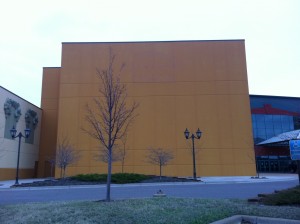The St. Michael City Council will finally address an issue that’s been on the front burner for city residents since last spring: should a church be allowed to purchase the former St. Michael Cinemagic Theater, setting a new precedent for a religious building in a designated commercial district.
The current members of the council and Mayor Jerry Zachman will hand down their decision on the issue at 7 p.m. tonight in the chambers at St. Michael City Hall. The meeting’s a day early due to Veterans Day tomorrow.
The decision will come on the heels of a recommendation by the St. Michael Planning and Zoning request to deny Riverside’s application for a zoning change – which would clear the way for a church building in a B-1 Commercial Zoned district.
After about two hours of discussion – led first by city staff offering their outline of a recent traffic study and its recommendation the planning commission submit a recommendation of denial to council – the board came down with a unanimous, 7-0 vote against the church.
 “In the end, it’s not the church,” said planning commissioner Keith Wettschreck. “They’re good people. This is about a city adhering to its comprehensive plan.”
“In the end, it’s not the church,” said planning commissioner Keith Wettschreck. “They’re good people. This is about a city adhering to its comprehensive plan.”
Commissioner David Dayon echoed that sentiment in his decision to recommend the city deny Riverside’s application.
“I’ve been through five or six comprehensive plan processes, and the biggest issue each time we look at it is, ‘Do we have enough land designated for commercial and industrial growth?’ Right now, the city only has about 2 or 3 percent of its land designated as business or industrial. I don’t feel like we can give a property like that up. This city has churches that have taken ample opportunity to build on available land that’s designated accordingly.”
The other “fly in the ointment” according to commissioners was the church’s attorney, C. Greg Howese, requested the application on his client’s behalf be recommended to the council with “no conditions or exceptions.”
Often, zoning applications will be passed on to council with those conditions. For example, the commission’s recommendation to approve Magic Water/Vetsch Plumibing’s purchase of the former Oasis Market site includes conditions stating the building must have a certain amount of square footage designated for showroom space, making it “fit” more properly into a commercial area despite Vetsch Plubming’s status as mostly a service/trade company.
Howese stated it would be “unconstitutional” for the city to place any sort of conditions on the Riverside purchase, pointing, as he has in the past, to the Religious Land Use and Institutionalized Persons Act of 2000. The act, passed by Congress, gives the church freedom to do what it wishes on the land once its purchased, Howese suggested.
That drew stern questions from both City Administrator Steven Bot and Community Development Director Marc Weigle, who said conditions make it possible for the city to address future issues at the site, such as traffic problems and public safety issues that could crop up if the church grew beyond its projections of 1,200 attendees.
Riverside and Howese downplayed that assertion, stating that, though there is capacity for more than 3,000 people in the building, it’s top projections show less than half of that attending on busy Sundays.
“I can see the use,” said commissioner Kyle Hartnett said of the church. “But I think what’s before us is a request with no conditions. And I’m not willing to recommend this without any sort of guideline.”
Others, such as St. Michael business owner Pete Scharber, owner of Marksman Metals, said the city needs to comply with the law.
“We’ve made adjustments. The city has been very particular that our expansion comply with the law. I think if you look, RLUIPA is the law. And it’s up to the city to comply. We’d be blessed to have Riverside as a member of our community,” he said.